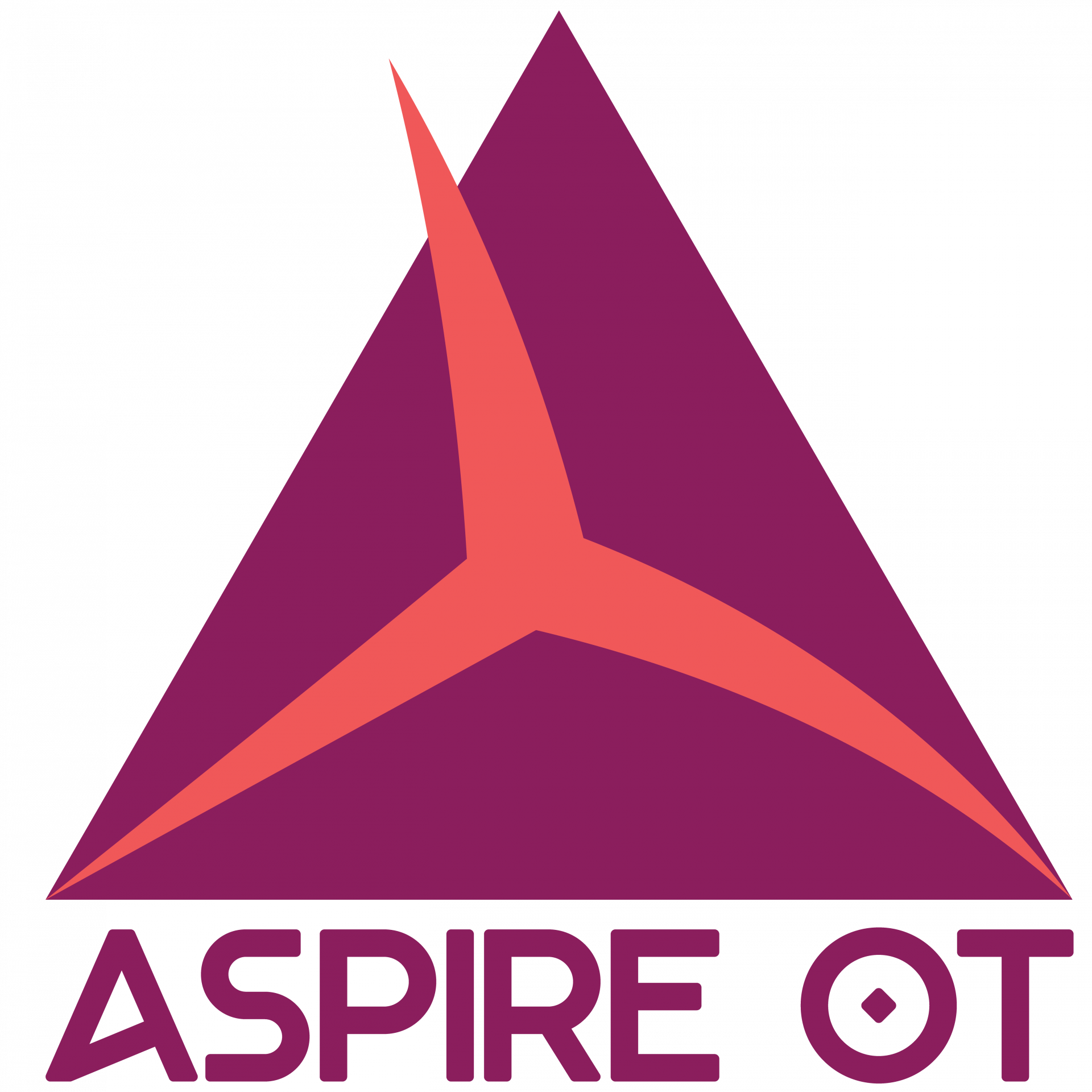
We are honored to welcome Aspire OT Instructor, Stephen Nawotniak, OTR, NYCPS as a guest blogger!
I am an occupational therapist living with a bipolar condition. Acceptance of something we want is easy because we like it. But what happens if we need to accept something we do not like or do not want? That is more complex. I have found that the acceptance of my chronic condition is a fluid and flexible thing. Sometimes I am ok with it. Sometimes I am frustrated with it.
The relationship or perspective I have regarding my condition makes a huge impact on how my life presents itself. I can find myself empowered to work with the condition or as a victim abused by it. Acceptance is a powerful thing and to support me through that process I have developed a tool I call The Acceptance Ladder.
I have found that accepting a chronic and uncomfortable experience is not a one-time thing. It is fluid and has varying degrees of acceptance based on how I am feeling at the time. It is a process, something that I often need to revisit and work through again and again. I have found that my level of acceptance is in one of 5 stages: CURSE, DIFFICULT, IS WHAT IT IS, TEACHER, and GIFT.
CURSE is the lowest level. Here, there is no hope. It was the level I was in when I was hospitalized for severe depression and diagnosed with bipolar disorder. I felt I was a victim, that the universe was against me, and that there was nothing that I could do about it.
DIFFICULT is next. It isn’t as bad as CURSE but it still hurts. I feel that it is a battle of my emotions and that it is work to manage the symptoms. I focus on the condition being an illness and that I am sick.
IS WHAT IT IS presents the third level. Here, I believe that the bipolar condition isn’t good or bad, right or wrong, fair or unfair. It is simply one way my imperfect HUMAN condition shows up. It is simply a chemical imbalance that I must manage in order to have a desired quality of life.
TEACHER is where I begin to see the bipolar condition as an opportunity for growth. The condition shows me what life skills are important for me to learn so that I can mature with my understanding. It challenges me towards personal growth through recognizing the needs that must be accommodated. It challenges me to act by principles while my internal feelings are chaotic. It shifts my focus from managing a set of symptoms to developing a philosophy to try and follow.
GIFT is the final level. It is here that I experience gratitude for the lessons learned and struggles conquered. I recognize that certain situations and their lessons learned would never have been experienced unless I had the challenges of the condition. It may be fleeting, but experiencing the bipolar condition as a gift can and does happen.
I have found acceptance a fluid process often involving a conscious self-dialogue to work it through. I have also found that one can only go up or down one level at a time, though its speed may differ based on experience working the tool.
I am an occupational therapist living with a bipolar condition. Acceptance of something we want is easy because we like it. But what happens if we need to accept something we do not like or do not want? That is more complex. I have found that the acceptance of my chronic condition is a fluid and flexible thing. Sometimes I am ok with it. Sometimes I am frustrated with it.
The relationship or perspective I have regarding my condition makes a huge impact on how my life presents itself. I can find myself empowered to work with the condition or as a victim abused by it. Acceptance is a powerful thing and to support me through that process I have developed a tool I call The Acceptance Ladder.
I have found that accepting a chronic and uncomfortable experience is not a one-time thing. It is fluid and has varying degrees of acceptance based on how I am feeling at the time. It is a process, something that I often need to revisit and work through again and again. I have found that my level of acceptance is in one of 5 stages: CURSE, DIFFICULT, IS WHAT IT IS, TEACHER, and GIFT.
CURSE is the lowest level. Here, there is no hope. It was the level I was in when I was hospitalized for severe depression and diagnosed with bipolar disorder. I felt I was a victim, that the universe was against me, and that there was nothing that I could do about it.
DIFFICULT is next. It isn’t as bad as CURSE but it still hurts. I feel that it is a battle of my emotions and that it is work to manage the symptoms. I focus on the condition being an illness and that I am sick.
IS WHAT IT IS presents the third level. Here, I believe that the bipolar condition isn’t good or bad, right or wrong, fair or unfair. It is simply one way my imperfect HUMAN condition shows up. It is simply a chemical imbalance that I must manage in order to have a desired quality of life.
TEACHER is where I begin to see the bipolar condition as an opportunity for growth. The condition shows me what life skills are important for me to learn so that I can mature with my understanding. It challenges me towards personal growth through recognizing the needs that must be accommodated. It challenges me to act by principles while my internal feelings are chaotic. It shifts my focus from managing a set of symptoms to developing a philosophy to try and follow.
GIFT is the final level. It is here that I experience gratitude for the lessons learned and struggles conquered. I recognize that certain situations and their lessons learned would never have been experienced unless I had the challenges of the condition. It may be fleeting, but experiencing the bipolar condition as a gift can and does happen.
I have found acceptance a fluid process often involving a conscious self-dialogue to work it through. I have also found that one can only go up or down one level at a time, though its speed may differ based on experience working the tool.
Register for Stephen's Courses
Write your awesome label here.
OT Mental Health Strategies for Adult Physical Dysfunction Settings
Live Webinar, November 14, 2023
1.5 Contact hour, 0.10 CEU
$30, AOTA Approved
In this course, Stephen Nawotniak, OTR/L, NYCPS will provide practical strategies that can be utilized by occupational therapists, occupational therapy assistants and students to address the mental health needs of clients typically seen in acute care, in-patient rehabilitation, skilled nursing, home health and outpatient settings.
In this course, Stephen Nawotniak, OTR/L, NYCPS will provide practical strategies that can be utilized by occupational therapists, occupational therapy assistants and students to address the mental health needs of clients typically seen in acute care, in-patient rehabilitation, skilled nursing, home health and outpatient settings.
Write your awesome label here.
OT & Mental Health: Applying the Occupational Therapy Practice Framework From a Lived Experience
Live Webinar, October 19, 2023
1.5 Contact hour, 0.10 CEU
$30, AOTA Approved
In this course, Stephen Nawotniak, OTR/L, NYCPS presents tools that can be used within the Occupational Therapy Practice Framework, 4th Edition (OTPF 4) while incorporating the perspective of his lived experience. Stephen is eager to share his experience to help OTs and OTAs better address mental health across various practice settings.
1.5 Contact hour, 0.10 CEU
$30, AOTA Approved
In this course, Stephen Nawotniak, OTR/L, NYCPS presents tools that can be used within the Occupational Therapy Practice Framework, 4th Edition (OTPF 4) while incorporating the perspective of his lived experience. Stephen is eager to share his experience to help OTs and OTAs better address mental health across various practice settings.
Occupational therapy addresses the whole person,
which includes their psychosocial needs
OTs, OTAs and students are uniquely qualified and trained to assess and treat mental health no matter what setting they are practicing in. Aspire OT provides continuing education that will grow your Mental Health Toolbox!
Occupational Therapy Courses Addressing Mental Health
We are better together!
Don't Miss A Thing!
Follow us on social media to stay up to date on all of our latest postings.
Join our newsletter
Get weekly updates on new blog posts, webinars, on-demand courses and more right in your mailbox.
Thank you!
Write your awesome label here.
Coaching, JUST for OT Practitioners Interested in
Implementing Psychosocial Interventions into Everyday Practice
Are you an occupational therapist, occupational therapy assistant or student who isn't sure how to address the psychosocial needs of your clients in your non-mental health setting?
Just for OT Coaching is here to help you. Let Kim and Niccole share their experiences in implementing psychosocial assessment and treatment into non-mental health settings to help you be successful!

